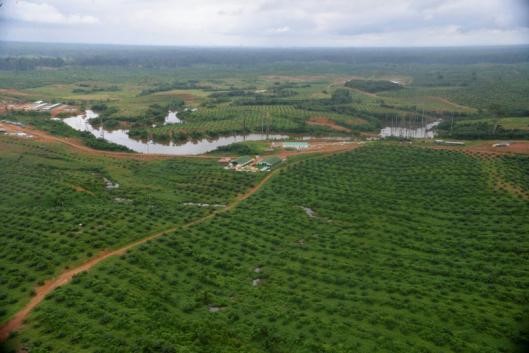WOR:D RAINFOREST MOVEMENT

Industrial palm oil production in West and Central Africa is mainly controlled by five multinational corporations, and could continue expansion. Plantations take up large tracts of land. Land and water are interdependent. Yet, the current water crisis in these territories would not exist if corporations had not grabbed the land from communities.
- Issues: Struggles Against Tree Monocultures / Palm Oil
- Countries: Gabon / Cote d’Ivoire
Industrial palm oil production in West and Central Africa is mainly controlled by five companies: Socfin, Wilmar, Olam, Siat, and Straight KKM (former Feronia). These multinationals control an estimated 67 per cent of the industrial oil palm planted area with foreign investment and may drive continuous expansion. (1) Their established industrial plantations have been linked to numerous impacts on the populations and territories.
The impact on water availability for communities that live in and around industrial oil palm plantations is systematic and dramatic. This is becoming increasingly evident with the many community reports of water scarcity and water pollution.
Industrial plantations often lead to loss of lakes, springs or streams, directly affecting the livelihoods and wellbeing of communities. Drinkable water becomes scare or inexistent. Besides, the intensive use of chemicals in the plantations and processing plants results in a high pollution of the water sources that remain available, posing a serious health risk for the population, workers and all life that exist in those areas. This also puts at risk local food sovereignty, as water availability for growing crops becomes increasingly challenging as well as fishing and drinkable water for livestock. In consequence, it is often women and girls who are forced to walk longer distances to access drinkable water. This in turn no only heavily increases their workload but also puts them at risk of sexual violence and harassment during the walks.
Palm oil plantations are systematically grabbing from communities and forests. Land and water are interdependent and cannot be separated. The water crisis would not exist if the companies had not taken the communities’ land. Their resistance is therefore one: to claim back their territories, with all that belongs to them.
World Rainforest Movement for more
